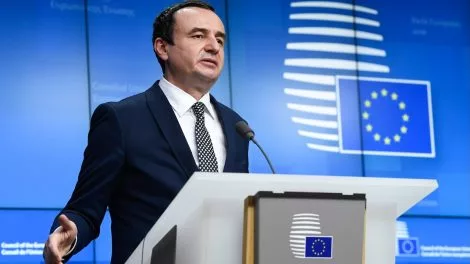On April 10, the euro group agreed on a 500 billion euros rescue package that made the Bulgarian government regret that it had decided to delay its plans to join the euro area.
Bulgaria’s relationship with the euro started long before the country became a member of the European Union. In 1996 the policies of the then socialist-led government led the country into an unprecedented economic crisis, which saw the bankruptcy of 15 private banks and annual inflation rates exceeding 300 per cent. The pro-Western government elected in 1997 had few options to act and signed a rescue agreement with the International Monetary Fund (IMF), introducing currency board regulations. As a result, the country had to peg its currency, the Bulgarian lev, to a fixed exchange rate: initially to the Deutsche Mark and later to the euro. What’s more, according to the agreement, domestic money supply was to be backed by sufficient foreign currency reserves, thus preventing the Bulgarian National Bank from having its own monetary policy.

It was with all these regulations in place that Bulgaria joined the EU in 2007 and will continue to stick to them until it introduces the euro, as stipulated in its EU accession treaty.
In 2009 the then newly elected government announced its plans to join the euro area as soon as possible, an intention that was quickly cooled down by the stormy situation following the global financial and economic crisis and its implications on troubled euro area countries. With the overall economic recovery in the EU afterwards and its solid macroeconomic and fiscal performance, Bulgaria once again made clear its plans to join the euro club during its presidency of the Council of the European Union in the first half of 2018.
In order to achieve eurozone membership, it has to firstly enter the Exchange Rate Mechanism (ERM II) – a waiting room where any country introducing the euro needs to stay for at least for two years.
If it were only the figures that mattered – like a balanced budget deficit and public debt levels not exceeding 25 per cent of Bulgaria’s GDP (!) – Bulgaria would have been already admitted to ERM II. Yet despite the support of the European Commission, member states in EU’s north expressed unofficial concerns that once Bulgaria joins the euro area it might be tempted to do away with its two-decades of prudent fiscal policy, thus repeating the so called ‘Greek’ scenario. In fact, Bulgaria’s economy has been closely supervised by the IMF for more than 22 years know, which has not allowed any space for statistical manipulations as was the case with Bulgaria’s southern EU neighbour. What’s more, there is clear public support in Bulgaria for a strict fiscal policy.
Another reason why Bulgaria is still not in the eurozone waiting room is due to the extra conditions requested by Eurozone governments – namely that Bulgaria has to join the ERM simultaneously with joining the Banking Union, a condition that has not been applied to any other country during its journey to the euro but which from now on will apply to all candidates.
As such, joining the Banking Union means that Bulgaria’s biggest banks have to firstly undergo stress-tests. This looks logical in light of the collapse of the fourth biggest bank in the country, the locally-owned Corporate Commercial Bank. It had to close after a bank run in 2014, which eventually questioned the quality of supervision of the Bulgarian National Bank. The European Central bank (ECB) carried out asset quality reviews and stress tests in 2019 and found shortfalls in two of the six Bulgarian banks it assessed – FIBank and Investbank. Both, locally owned, banks were required to build up additional capital buffers, which as of the beginning of April 2020 FIBank had still not achieved.

In late 2019 the government announced it hoped to join the ERM II by the end of April 2020. However, several poorly communicated and quickly passed law amendments in early 2020 led to a wave of fears of a possible devaluation of Bulgaria’s currency from its long-standing peg to the euro, hence, to a hike in real estate transactions and a boom in converting deposits from lev to euro. All of these developments made Prime Minister Boyko Borissov decide to “slow down the tempo” in order to achieve an absolute consensus in the country, so Bulgaria delayed its formal application until July. Surprisingly, Bulgaria’s prime minster then declared on April 10 that the delay was a mistake and that efforts to join eurozone waiting room would be resumed immediately. The formal reason for the U-turn was the 500 billion euros pandemic rescue package announced by the finance ministers of the euro group member states earlier that day.
It is beyond any doubt that public support for introducing the euro in Bulgaria has been in decline for several years. Understandably, this is linked to some extent by rational and pragmatic reasons ranging from memories of the euro area crisis and sentiment towards the national currency to fears about potential decline in purchasing power. However, there are also other factors – depicting the EU as fading power, Bulgaria as an underperforming member state, and the common currency as a trap that works in the interest of third parties that would love to see a weakened country on the EU’s periphery. These are all ideas which can easily be used in order to gain domestic support and to back anti-EU voices in Bulgaria.
Explaining to the broader public what the euro is, along with its benefits, should not be scheduled for the months before its actual introduction. It should start as soon as possible and there a plenty of good reasons to be disseminated.
First, joining the core of European integration will be another anchor that can safeguard the trajectory Bulgaria embarked upon more than two decades ago. Second, because of its fixed exchange rate Bulgaria is a de facto member of the euro area, though, de jure, it has no voting rights and thus accepts all decisions from Frankfurt without having a say.
Bulgaria cannot devaluate its currency and make its exports more competitive, unlike other non-euro countries in Central and South Eastern Europe. Third, almost 50 per cent of the overall exports from Bulgaria go to euro area member states, or in other words over 70 per cent of exports to the EU go to the eurozone. Fourth, joining the euro waiting room together with the Banking Union will unquestionably improve the supervision of systemically important banks in the country and is highly likely to prevent situations like the collapse of Corporate Commercial Bank in 2014. Fifth, the cost of borrowing will decrease, and households and companies will benefit from significantly lower interest rates. Last but not least, the post Covid-19 recovery will surely look different for euro area countries and for non-euro member states that will not be eligible for rescue package support to the same extent.
So if there is something positive to draw from the current situation, it is certainly the fact that the government seems to be willing not to let the crisis go to waste, and that it will finally do what it really takes to join the euro area.
—
Unlike many news and information platforms, Emerging Europe is free to read, and always will be. There is no paywall here. We are independent, not affiliated with nor representing any political party or business organisation. We want the very best for emerging Europe, nothing more, nothing less. Your support will help us continue to spread the word about this amazing region.
You can contribute here. Thank you.

Published by: emerging-europe.com




